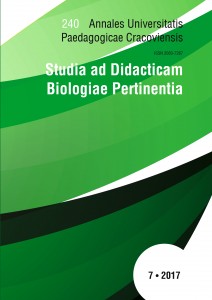New society – diagnosis of knowledge about crucial ecosystem services – pollination
New society – diagnosis of knowledge about crucial ecosystem services – pollination
Author(s): Elżbieta Rożej-Pabijan, Małgorzata MielniczukSubject(s): Preschool education, Methodology and research technology, Evaluation research, Human Ecology
Published by: Wydawnictwo Uniwersytetu Komisji Edukacji Narodowej w Krakowie
Keywords: ecological awareness; preschool children; parents; entomology;
Summary/Abstract: Ecosystem services are natural processes that allow humankind to reap benefits. Ecosystem services are involved in the provision of clean drinking water and then decomposition of wastes. It includes also pollination and recreation benefits. Many ecosystem services are being assigned economic values as they provide or support processes, that otherwise would be costly. For effective protection of ecosystem services and environment of great importance are law regulations but also social awareness and appreciation of natural values. Studies involving social understanding of natural processes and functioning of ecosystem services are uncommon. The level of social awareness of functioning ecological processes like pollination was newer studied before. This one-year study focused on the understanding of ecosystem services on the example of pollination. For this purpose entomological knowledge among preschoolers (4 to 6 years old) and their parents was studied. The aim of our study was to define the attitude towards pollinating insects and level of knowledge about ecological importance of pollinators among preschoolers and their parents. Children were engaged in solving the survey from questionnaire concerning different aspects of entomology, mainly pollinators. Tasks had different level of difficulty. They concerned, among others, the recognition of insects on the basis of colored illustrations, justifying why pollinating insects can often be found on flowers, declaring how the children or parents behave when they meet a bee at their home. The study was performed on 74 preschoolers and their parents. Findings indicate that preschool children, regardless of their age, correctly classify from illustrations, representatives of insects, and differ it from other animal groups like fish or amphibians. More difficult for the 4-year-olds was to correctly name representatives of insects. Most recognizable was a honeybee, butterfly and an ant. Older children – five- and six-year-olds were most frequently correctly identifying more insect species than 4-years old. However, among pollinators, bumblebee was a species named incorrectly most frequently. In comparison – most parents identified correctly four out of six insects – including bumblebee. All parents agreed that pollinating insects play an important role in ecosystems, however when they were asked to choose insect orders engaged in pollination they all indicated butterflies, but only less than a half choose hymenoptera, that include bees. Our results indicate, that social awareness among preschoolers and their parents about pollination is incomplete. Majority of respondents agreed that pollination is important. However identification of main insect orders and species engaged in pollination is wrong as is the understanding of ecological meaning of the process.
Journal: Annales Universitatis Paedagogicae Cracoviensis. Studia ad Didacticam Biologiae Pertinentia
- Issue Year: VII/2017
- Issue No: I
- Page Range: 41-52
- Page Count: 12
- Language: English

